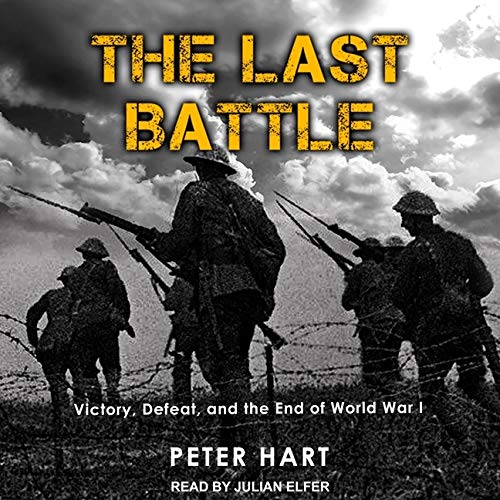What do you think?
Rate this book


Audio CD
First published February 15, 2018
This is a book by an oral historian on the final series of battles sponsored by the Allied Command in Chief, Marshal Foch that successfully broke the back of the German army on the Western front and finally resulted in their capitulation. Because of the exhausted state of the French forces in 1918, these battles were largely fought in the British sector.
The book provides background information of the battles and commentary on the their execution. This in interspersed with quotes from the letters and diaries of the participants to give the soldiers views of what happened. This make very interesting reading.
However, as an Australian, I am a little annoyed of his treatment of the Australian Corp commander John Monash. Sorry, I take that back. I am very annoyed. He seems to be have fallen for the anti-Monash propaganda generated by a motley crew of anti-Semitic allied war correspondents of which Keith Murdoch the father of Rupert of Fox news fame was one of the ring leaders. The author uses a paragraph of one of Monash letters where he is critical of the English junior officers to paint him as a small minded and intolerant of the fellow allied troops. John Monash had built an engineering empire starting as the son of country shopkeeper before enlisting for the war. He as an excellent man manager! If John Monash wrote that there was an issue with the competence of the English junior officers then there was a problem with these officers. I suspect that Monash was annoyed at the failure of the English to promote their junior officers from the ranks. It is ironic that most of the quotes attributed to Australians in the book come of a book written about Albert Jacka who started the war a private and ended as Captain.
While I am on my pro-Monash rant. I would like to point out to the author that the “All Arms Battle” he so enthusiastically praises was largely the creation of Monash and his staff. (Monash just didn’t just execute the tactics designed by other as the author states, he and his staff were the innovators that developed the key parts of it.) Once Monash had demonstrated the effectiveness of the tactics at La Hamel, he caught the eye of Haigh who gave him the resources to execute on a larger scale at the Battle of Amiens. This resulted in a breakthrough of the German lines. (Ludendorff’s “The Black Day of the German Army”!) Australian armoured cars were allowed to rove around behind German line and create havoc. (Monash was annoyed that orders from higher commanders prevent the Australians from exploiting the situation further.)
But Monash was not a one trick pony. He was aware that easy gains could be made if the pressure was maintained on the Germans before they had a change to really dig in. He demonstrated this to Foch in the Battle of Mont Saint-Quentin. Without the services of tanks or heavy artillery, the Australians used basic fire and movement to remove the Germans from the Somme river. (Foch later described this as one of 'finest feats of arms in a time rich in innumerable deeds of heroism'.) This breakthrough energised Foch to go all out with the allied offensive starting in late September. These battles ended the war and is focus of the book.
Monash didn’t win the war but he deserved a lot more credit for the allied victories in 1918 than this author has given him. And his treatment of Monash make me doubt the accuracy of what else he is written.
Overall the book is a worthwhile read, but I warn any fellow Australians to take an double dose of their blood pressure medication before they start reading.